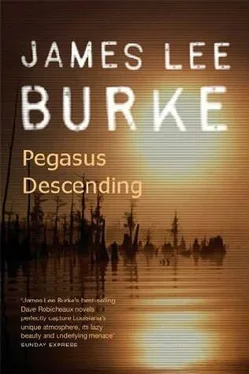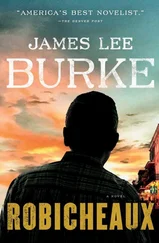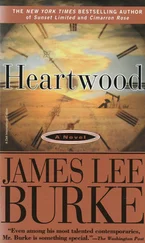A light-skinned Negro who lived in his car and made his living sharpening knives was stopped and questioned at a roadblock on the parish line two hours later. He could not account for his whereabouts that night, except to say he had pulled off the road at sunset to take a nap under a tree. He stank of sweat and Hawaiian Punch that he had laced with sloe gin. A crumpled paper bag of the kind used by the grocery store owner lay on the backseat, along with an empty baby bottle. Both of his hands were swollen, his knuckles skinned.
His court-appointed attorney introduced evidence to show that the paper bag found in the defendant’s car was manufactured by a company that sold the same type of paper bags all over the state. The lawyer also found a witness who testified that the defendant had been involved in a fistfight two days before his arrest. The black man took the stand and told the jury a hitchhiker had left the baby bottle in the car. But on cross-examination he contradicted himself about where he had picked up the hitchhiker and where he had dropped her off. He also could not explain the fact that at the time of his arrest he had a two-dollar bill in his possession.
The knife sharpener was sentenced to death by electrocution. But in the ensuing weeks, several of the jurors developed problems of conscience. They mentioned the fact that the two-dollar bill found on the Negro man had no thumbtack holes or apparent indentations on the corners. More important, they remembered that originally the victim had identified her attacker as a “red-bone,” a person of mixed Indian, Negro, and white blood. The man arrested at the roadblock was clearly a mulatto, with no distinguishing Indian features whatsoever.
Then one night during an electrical storm, three men wearing masks broke the condemned man out of the parish prison, but not to set him free. They beat him senseless with a sap, gagged and handcuffed him, and took him deep into the Atchafalaya Basin in a powerboat. On the edge of the river, while lightning lit the endless gray miles of flooded gum and cypress trees, they dragged him up on a sandspit and pulled his trousers down over his buttocks. One of them produced a cane knife from the boat, then the three began to argue in French over who had the most right to deliver the first cut. But they had made the mistake of cuffing the condemned man’s wrists in front of him. He got to his feet, his trousers tangling around his ankles as he staggered to the edge of the sandspit and plunged into the river.
By all odds he should have drowned. Instead, he clung to a pile of river trash and uprooted cypress trees, the rain stinging his face, and floated downriver until sunrise, when a man on a houseboat fished him out of the water with a boat hook.
Three weeks later, Louisiana ’s traveling executioner arrived in town with the flatbed truck that carried the boomed-down generators and rubber-encased cables that powered the instrument of his trade. The mulatto who had escaped a lynching in the Atchafalaya Basin was buckled down in an oak chair and jolted three times against the straps while the victim and her husband sat in folding chairs and watched.
Two months after that, a man and his wife were arrested outside Oklahoma City for the robbery and sadistic murder of a family who operated a roadside fruit stand. They were caught only because they were turned in by a relative upon whom they had dumped their infant child. They denied ever having been in the state of Louisiana, but a receipt from an Opelousas motel, dated the night before the attack on the female grocery store owner, was found under the front seat of their automobile. The man was half Choctaw Indian. In his wallet was a worn two-dollar bill, each corner pierced by what appeared to be a thumbtack.
Bellerophon Lujan’s name surfaced again and again whenever the story of the attempted lynching was told. His father had been a close friend of the rape victim’s family. His uncle had gone to Angola for killing a Negro farmworker with a hoe. Bello was notorious for bragging on his sexual conquests of black women, and it was obvious to any reasonable person that his anger toward the Negro race seemed to exist in direct proportion to his libidinal fascination with them. Whenever the subject of race came up in a barroom conversation, Bello ’s eyes became lustrous with secret thoughts and memories he did not share.
Shortly after 2 p.m. I checked out a cruiser and drove to Bello ’s horse farm up the Teche. After I rang the chimes, I waited in the shade of his porch, watching the shadows of clouds sliding across his pastureland. In the side yard I heard a flapping sound, like fabric lifting in the wind, and a clinking of metal upon metal. Then I remembered where I had heard those sounds before. I started to walk around the side of the house, when a big black woman in a nurse’s uniform, her white hair held in place by chemical spray, opened the front door. “Yes, suh?” she said.
“I’m Detective Dave Robicheaux, here to see Mr. Lujan,” I said, opening my badge holder.
“He’s not here, suh.”
“Where is he, please?”
“He didn’t say where he was going.” She had been looking me straight in the eye, but her gaze broke. “He took the dog wit’ him. So maybe they went to the park. Or maybe downtown somewheres.” Her eyes came back on mine.
“Is that Mr. Robicheaux, Regina?” a voice said from the sunporch.
But I kept my attention on the black woman. “Come out on the front porch with me,” I said.
“Suh?”
I stepped backward, taking her hand in mine. She followed me outside, glancing back once.
“What’s Mr. Bello up to, Miss Regina?” I asked.
“I’m making ten dollars an hour here. I cain’t lose this job.”
“Tell me where he went.”
“He took the rottweiler. That dog mean t’rew and t’rew. You don’t walk a dog like that in the park, no.”
“Go back inside and tell Mrs. Lujan I’ll be right there,” I said.
“Suh?”
I said it again. This time I placed my hand reassuringly on her upper arm. “I give you my word no one will know what you just told me,” I said.
She went back inside the house uncertainly, leaving the door ajar. With my back to the house, I opened my cell phone and punched in the number to Helen’s office.
“Sheriff Soileau,” she said.
“I’m at Bello ’s house now. Mrs. Lujan’s nurse says he left here with a rottweiler. Better get somebody over to Monarch’s place.”
“You got it, bwana,” she said.
I stepped inside the living room and saw Mrs. Lujan out on the sunporch, staring at me from her wheelchair. She was dressed in a flowery blouse and beige skirt, but the seasonal cheeriness of the colors only accentuated the pallor of her skin and the obvious deterioration of her bone structure. Through the windows I could see freshly mowed St. Augustine grass and a bank of shade trees in the background and a pale green canopy set up on aluminum poles. The canopy was swelling with wind, a loose chain on one corner rattling against a pole.
“Are you here about Tony?” she asked.
“Monarch Little has been released from jail on bond. We’re concerned your husband might want to take the law into his own hands,” I replied.
She watched me in the same way a bird watches a potential predator from atop its nest. She was originally from the Carrollton district of New Orleans and had come to Lafayette to study drama at the university when she was only a girl. Her parents, who had been successful antique dealers, were killed in a commercial airline accident her freshman year. Mrs. Lujan, whose first name was Valerie, left school and went to work for a man who made breakfast-room furniture out of compressed sawdust and sold it to the owners of double-wides and prefab homes during the domestic oil boom of the 1970s. Then she met Bellerophon Lujan and perhaps decided that the dreams of a young drama major were just that-dreams that a mature woman tries to put aside with only a brief pang of the heart.
Читать дальше












